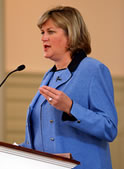
On Thursday, February 19, famed Enron whistleblower Sherron S. Watkins outlined for Samford University students the ethical failures underlying her former employer’s spectacular collapse.
Celebrated among Time magazine's Persons of the Year in 2002, Watkins now speaks throughout the country, sharing the lessons of her experience.
Watkins, who visited Samford as a School of Business Ethics speaker, was for many years a high-flying accountant who traveled the world for Enron. But at age 42 and with a two-year-old daughter to consider, Watkins traded her glamorous position for what she thought would be quiet "back room" accounting jobs. In her new position under Chief Financial Officer Andrew Fastow, Watkins soon discovered Enron account discrepancies in the hundreds of millions of dollars.
"The math didn’t add up," she said.
When Watkins questioned her colleagues about the discrepancies, they explained to her, "without a bit of alarm in their voices," the complex and apparently fraudulent structures at the heart of the corporation.
Watkins approached Ken Lay, Enron’s CEO, with what she thought was shocking news--that unprecedented conflicts of interest had allowed Fastow, in particular, to create structures both within and outside of Enron that enriched himself and exposed the corporation to financial ruin and legal action. Watkins now admits that she placed too much trust in Lay, thinking he was merely "out of touch."
Lay opened an investigation into her charges, but Watkins says that effort was a "whitewash," intended only to find out if there was some fraud that Enron executives weren't already aware of. Later, as a witness before a U.S. Senate committee investigating the collapse of Enron, Watkins learned that Lay had launched a parallel, but unsuccessful, investigation with the aim of finding legal grounds to fire her before she approached the financial press or federal regulatory agencies.
Six weeks later, Enron was bankrupt, Watkins was on the way to fame as a heroic whistleblower, and the company’s former executives began their slow march toward indictment.
Watkins was especially outraged by the conduct of former Enron CEO Jeffrey Skilling. She said Skilling served as CEO for less than a year before suddenly resigning, citing personal reasons as well as the disappointing performance of the company’s stock. Where some might call in sick, she said, Skilling "called in rich" and walked away from the mess that would destroy the company soon after his departure.
Enron declared bankruptcy on December 2, 2001. On December 3, 5,000 Enron employees were assembled and told that they had received their last Enron paycheck and might lose their health insurance as well. Their misery was soon compounded by revelations that Enron executives had essentially looted Enron’s coffers to cushion their own fall.
"Really, it created an angry mob," Watkins said of the executives' betrayal of their employees. "When you're the captain of the ship, you're responsible for the crew."
She predicted to her 8 a.m. Samford audience that, for his alleged role in the fraud, Skilling "is headed for the handcuffed perp-walk any day now." By 9 a.m., Internet media outlets had posted photographs of a handcuffed Skilling in the custody of federal law enforcement agents.
Enron is gone, but the corporate and individual ethics questions it raised remain.
Although Watkins had only recently moved into a position that allowed her to uncover Enron's accounting fraud, she had by that time worked for the corporation for eight years.
"How was I working for a company that had become so rotten?," she wondered. She pointed out that many Enron executives were considered good Christian people. She said Ken Lay is the son of a Baptist minister, and his own son is studying to enter the ministry. She said Andrew Fastow, recently sentenced to prison for his role in Enron's collapse, is a conservative Jew. She also reminded the capacity-crowd in Samford's Reid Chapel that "the Bible is chock-full of good people doing the wrong thing."
Watkins warned that the process of ethical ruin is not as straightfoward as approaching the edge of a cliff and deciding at the last moment whether or not to take that final, catastrophic step. She compared the process to walking down an ever-steeper slope that doesn't advertise its dangers until one has passed the point of no return.
"It's the slow steps to disaster we all must pay attention to," she said, because even a a relatively small ethical lapse--stealing a company pen or padding an expense account--"dulls your sense of right and wrong" and compromises willingness to speak out against more significant lapses.
Ultimately, Watkins said, corporate ethics depend on the ethics of the individual.
"Don't fall for any groupthink or rationalization that it's okay because it's not you, it's your corporation," she warned, adding that many lower level employees are indicted long before high profile executives are led away in handcuffs.
Watkins also urged the students to heed their personal ethical alarm bells and leave unethical employers before it becomes too late. When a corporation claims to value a code of ethics, but rewards those who ignore that code, it's time to leave, she said.
According to Watkins, on paper Enron was at the "top of the list" in corporate ethics. The Enron code of ethics was ever-present in the form of posters and other daily reminders. Watkins said even Enron's official telephone notepad carried famous exhortations to ethical conduct. In fact, that notepad's quotation of Martin Luther King, Jr. provides an ironic and instructive moral to Watkins' story: "Our lives begin to end the day we become silent about things that matter."
